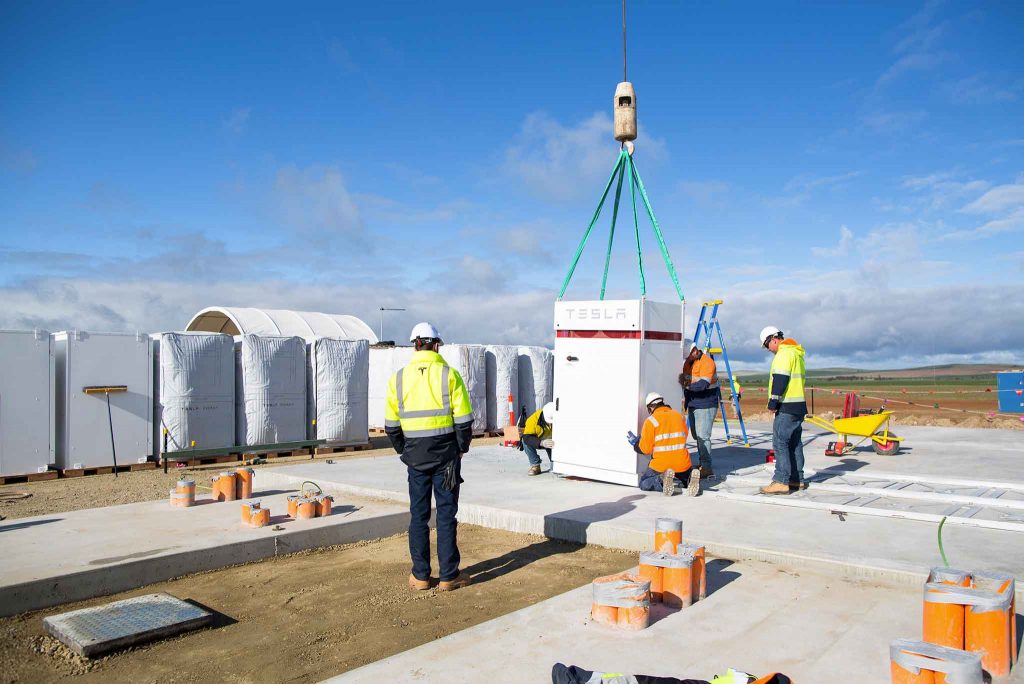Charging ahead with new funding for big batteries
Renewable energy stored in large banks of batteries will help to make electricity supplies more affordable and resilient.

The next generation of grid scale batteries will be supported by $100 million of ARENA funding, as part of efforts to grow the deployment of renewable energy.
The Funding Round will be open to large scale battery storage projects that demonstrate the use of grid forming battery inverter technologies.
A new wave of advanced battery inverters are able to send and receive signals from network operators and the grid, allowing batteries to respond quickly to imbalances and energy shortfalls. The job has historically been performed by coal and gas power stations, but batteries are proving well suited to the task.
Able to respond within milliseconds to issues, Australia’s growing fleet of grid scale batteries are making energy supplies more stable and helping energy users to save money.
The new funding will be available to new battery projects of 70 MW or larger, as well as applicants seeking to retrofit advanced inverters to existing batteries.
ARENA expects the funding will support at least three projects, with a maximum of $35 million available for a single project.
Eye to the future
Finding renewable ways to deliver vital grid-supporting services will be important as more fossil fuel plants are phased out.
ARENA CEO Darren Miller said that the new funding will help to show the value of advanced inverters to accelerate the transition to renewable energy.
“Grid scale batteries and other types of energy storage technology will be vital to support our future electricity system powered by renewables,” he said.
“This Funding Round will demonstrate the role of advanced inverters in grid scale batteries to provide system stability, facilitating a more efficient transition and accelerate the uptake of renewable generation.
ARENA has already supported the delivery of six large scale batteries including at Gannawarra and Ballarat in Victoria, as well as Lake Bonney in South Australia and a recent expansion of the Hornsdale Power Reserve.
“We’ve seen promising signs that advanced inverters can support system stability, but it’s clear public sector investment is still needed to prove the technology at scale,” he said.
The competitive Funding Round builds upon ARENA’s previous support for batteries as well as system security trials. A recent study by Powerlink Queensland found that advanced inverters can play a valuable role in maintaining system strength supplementing the use of synchronous condensers.
The ARENA-funded 30MW, 8 MWh Energy Storage for Commercial Renewable Integration (ESCRI) battery in South Australia is currently Australia’s largest grid-connected battery using advanced inverter technology, but this will be surpassed once Hornsdale Power Reserve completes its upgrade to advanced inverters.
The Hornsdale Power Reserve in South Australia was the world’s first grid -scale battery when it came online in 2018, with owner Neoen finding that it saved consumers $116 million in 2019 alone.
Big role for batteries
The Australian Energy Market Operator’s (AEMO) Draft 2022 Integrated System Plan forecasts that almost all coal-fired electricity generation will retire by 2040, to be replaced by wind and solar farms backed up by at least 30 GW of grid scale firming capacity capable of responding to a dispatch signal.
Batteries will play a role in firming the variability of wind and solar, along with other storage technologies including pumped hydro.
The use of big batteries is growing as the cost of the technology falls quickly, with the latest Gencost report prepared by AEMO and CSIRO finding that battery costs are falling faster than any other generation or storage technology.
While there are seven big batteries currently in operation on the National Electricity Market (NEM), AEMO has identified a further 23,418 MW of battery storage capacity in the planning pipeline.
Expressions of interest now open
More information about the new funding can be found here on ARENA’s website, including details about the application process.
Expressions of interest will open in February 2022 with selected projects to be invited to submit a full application later in the year.
Expressions of interest will close on 31 March 2022.
LIKE THIS STORY? SIGN UP TO OUR NEWSLETTER

ARENA